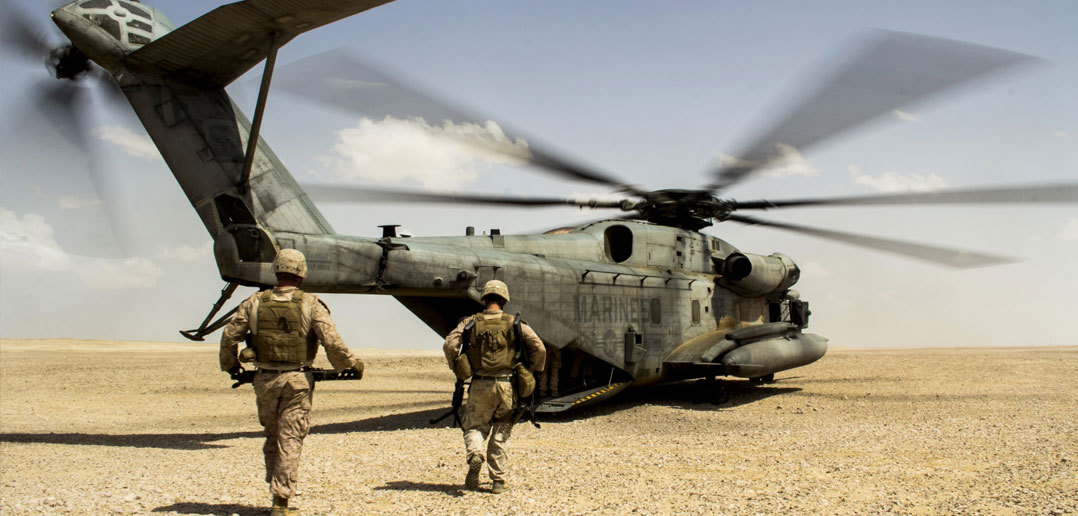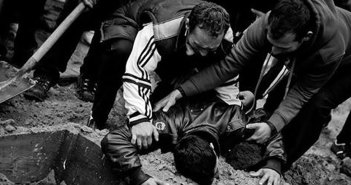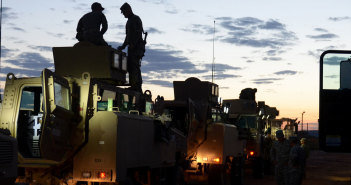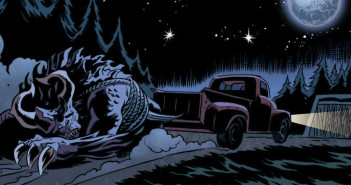The eye of the new moon was tightly shut as Cpl. Daniel Kuhns’ unit crossed over the Kuwaiti border into southern Iraq in March 2003. The midnight mission was clear: secure the oilfields so that the towers could not be ignited by Saddam Hussein’s military. The unit dispatched to undertake the mission was comprised of a platoon of tanks and LAV vehicles alongside a cluster of Amtrak transporters carrying Kuhns and his fellow Marines. They traversed 50 miles of desert under the night’s pitch-black sky. Kuhns recalls the blanket of stars overhead—with no light pollution, the tiny dots peacefully twinkled above.
But the peace ended when the oilfields were reached. Saddam’s forces arrived first and had already dug themselves into defensive positions. At that moment, the Marines’ first battle in the Iraq War erupted; the black night was lit up by the flashes of gunfire and rocket-propelled grenades. But the Marines had an edge: air support had already hit the Iraqis early in the night, delivering damage and casualties. Throughout the battle, Kuhns noticed several bombed-out Iraqi vehicles set aflame, lighting the battlefield like lanterns of warfare. He couldn’t discern the number of enemy casualties, but the firelight illuminated random bodies strewn across the desert. But the smell is what lingers in the Marine’s memory. “It’s unforgettable; a mixture of oil, diesel exhaust, and burning flesh,” Kuhns recalls.
The battle continued until dawn broke. The morning sun revealed the gravity of what happened the night before. Enemy bodies littered the ground: some were shot, others burned, and many destroyed beyond recognition. The sand was a cocktail of shell casings, rubble, ash, and blood. “What happened that night, it almost seemed surreal—more like a bad dream than an actual event,” Kuhns says.
Later in the morning, the Marine was on watch while his vehicle’s commander was nearby reading the Bible. He suggested that Kuhns would find solace by thanking God for seeing him safely through the battle. “I asked him how he could be scared seeing the other Marines fighting by his side last night.” None the less, Kuhns understood his commander’s need to find meaning outside of training and luck. But because Kuhns was an Atheist in the United States Marine Corps, religion and prayer were not tools he used to make peace with his military career.
“NO PREFERENCE”
As he grew up in Washington D.C., Daniel Kuhns didn’t lead a religious life. Church attendance was a rarity at best, and even then he and his family were only “going through the motions like everyone else.” Kuhns, now 28 years old, developed a voracious appetite for books when he entered his teens, and began reading whatever he could get his hands on; no topic was off limits. The more he read, the more developed his opinions became, and a conscious distrust of religion evolved. He didn’t need or want anything to do with it. “I had never been a believer, so it wasn’t a hard transition,” Kuhns says.
When Kuhns turned 16, he suffered the death of his mother. He was encouraged by well-wishers to find consolation in faith, which he thought was ridiculous. “I never once prayed, and I wouldn’t do it [then]to make myself feel good. I was going to get through it myself,” Kuhns says. When he graduated high school, college was immediately ruled out. “I needed some direction and adventure,” Kuhns says. The military was recommended by a friend, so he visited his local Marine Corps recruitment office where he enlisted in September 1999.
Looking back on it all, Kuhns wouldn’t trade his experiences as a Marine for anything. He’s proud of his service, and he believes that his time in the military gave him the drive and motivation he needed to achieve success in life. But the journey wasn’t easy. The physical hardships of daily training were intense, and the mental discipline required for success was demanding. But the presence of religion in the military was an unexpected factor that Kuhns had to adjust to quickly. “The military is far from secular,” Kuhns says, remembering the prayers that bookend all military ceremonies. “I usually kept my mouth shut,” he continues. Time specifically for Sunday church services was also carved out of Kuhns’ training schedule at boot camp. At first, he attended to avoid unwanted attention, but soon after he stopped all participation completely. Kuhns’ particular situation was lax—he was able to use the time intended for church to read. Other duty stations are much stricter and require either church attendance or barracks maintenance, which amounts to cleaning.
A decisive moment arose when Kuhns had to identify his religion on his dog tags. He initially left the area blank, but it didn’t take long for him to be pressured further to choose a religion. The Marine was adamant, and he officially stated “No Preference” on his tags. At the time, he was reserved about his atheism and didn’t pay his beliefs much thought. On more than one occasion, Kuhns was questioned about his non-theism and debates would spring up. The discussions were always civil and he never pressured anyone with his values. “But I knew [what]I believed, and [the discussions]weren’t going to change my point of view.” It wasn’t until later in life that Kuhns began to actively explore his atheism as well as his morals as a humanist.
Religious practice in the military is guided by the chaplaincy, the organization of religious figureheads who are accessible at all times. Every unit has a chaplain attached to it, and they commonly act as stand-in counselors. Despite being an Atheist, Kuhns believes that the chaplaincy is more a positive than a negative since trained counselors are oftentimes hard to come by. “They are too few [in order]to help all people in the military,’ he says. But despite the important services chaplains facilitate, Kuhns was also acutely aware of situations when they used their influence to proselytize impressionable young Marines under duress instead of offering secular counsel.
ATHEISTS IN FOXHOLES
There’s an old adage burned into Daniel Kuhns’ mind: “There are no Atheists in foxholes.” The phrase’s origins are unclear—it’s believed to have been coined during World War II by Lt. Col. William J. Casey, but has also been attributed to the roving journalist, Ernie Pyle. But regardless of the phrase’s beginnings, it’s factually inaccurate. There are even organizations like the Military Association of Atheists and Freethinkers and the Military Religious Freedom Foundation that lead the way in defending secular and non-theistic rights within the military.
Kuhns himself is living proof that there are Atheists in foxholes. After his involvement in the onset of the Iraq War, he was honorably discharged from the Marine Corps in September 2003. In 2005, he began his college education at the University at Albany, focusing on sociology and history. Kuhns eventually took a liking to public relations, which led to an internship in Albany. By chance, the woman he worked under was married to the executive director of the Institute of Humanist Studies (IHS). With a little networking, he landed another internship with IHS, working in the institute’s public relations and lobbying department. The work gave Kuhns great pleasure and proved to be one of the most interesting and challenging experiences in his civilian life. He graduated from college in 2008 and currently works in the professional communications and public relations industry in Washington D.C.
Kuhns strongly believes in religious freedom, but he also understands that such freedom grants religious institutions the power to try to eliminate the separation of church and state. And just as there are Atheists in civilian life, there are Atheists fighting and dying in the military, too. Combat is an experience unlike anything else, and because of that Kuhns is firm that religion and the chaplaincy both play an important role in the lives of the military’s members. But he himself never lost sight of his own values as a humanist, despite the many close calls he vividly remembers. He never once turned to religion to help see him through his career as a Marine. Some of his closest friends are fellow brothers-in-arms, and he never needed religious faith while in their presence. Kuhns concludes, “The one thing all Marines believe is that you always look out for the man to your right and left … the other Marines I fought with protected me with their lives, as I did with my life for theirs.”
This article originally appeared in American Atheist magazine. To view the PDF version of the piece’s original publication, please click here.




